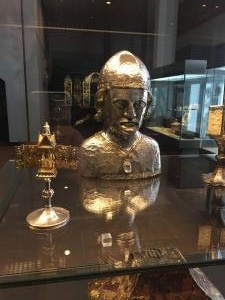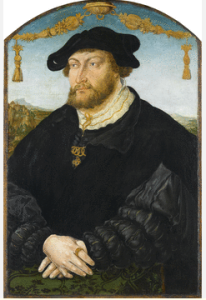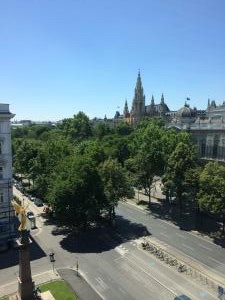This fall marks the 20th anniversary of the Washington Conference on Nazi-Era Assets and the corollary Washington Principles on Nazi-confiscated Art that have driven much of the conversation since then. Apollo magazine published my thoughts on the impact of the Washington Principles, which I reproduce below (British spelling, thank you), as well as a thoughtful piece by Martin P. Levy (a member of the UK Spoliation Advisory Panel, one of the commissions created in response to the Washington Principles).
Zum Geburtstag Viel Glück? The Washington Principles Turn 20
Topics: Nazi-looted art, SPK, Advisory Commission, Stiftung Preussischer Kulturbesitz, Washington Principles, HEAR Act, UK Spoliation Advisory Panel, Apollo Magazine, Holocaust Expropriated Art Recovery Act of 2016, Washington Conference on Nazi-Era Assets, Department for Digital, Culture, Media and Sport, National Gallery in London, Claims Conference, JUST Act
Herzog Heirs Win Again in Appeals Court on Jurisdiction Over Hungarian Museums
A federal appeals court has upheld the growing consensus that the Foreign Sovereign Immunities Act (FSIA) confers jurisdiction over foreign state actors in possession of art allegedly looted by and/or overseen by the Nazis. Upholding last year’s District Court decision, the U.S. Court of Appeals for the D.C. Circuit affirmed the ruling in De Csepel v. Republic of Hungary that denied several Budapest museums’ motion to dismiss, while allowing the Republic of Hungary itself out of the case. This is the heirs second successful trip to the appellate court, where their claims were upheld in 2013. The case is the subject of a chapter in my newly-released book A Tragic Fate--Law and Ethics in the Battle Over Nazi-Looted Art (ABA Publishing).
Topics: Berlin, David de Csepel, Angela Maria Herzog, Thyssen-Bornemisza Collection, Foreign Sovereign Immunities Act, Baron Herzog, Budapest University of Technology and Economics, Hungarian National Gallery, SPK, Stiftung Preussischer Kulturbesitz, Budapest Museum of Fine Arts, FSIA, expropriation exception”, Cassirer v. Kingdom of Spain, Federal Republic of Germany, András Herzog, Welfenschatz, genocide
Nazi-Looting and Forced Sales Support Jurisdiction—Guelph Treasure Ruling Analysis
The decision on Friday to allow our clients’ claims to proceed against German and the Stiftung Preussischer Kulturbesitz for the restitution of the Guelph Treasure (or Welfenschatz) is ground-breaking in important respects, and a welcome part of a consistent progression in the law of sovereign immunity over claims for Nazi-looted art. As we noted in our initial reaction, it is the first decision in which a U.S. court has held that it has jurisdiction over Germany or an agency or instrumentality of it under the Foreign Sovereign Immunities Act (FSIA) for a claim to Nazi-looted or purchased art—though others have certainly tried—in this case finding the so-called expropriation exception applies. Critically, it recognizes that claims about forced sales in the early days of Nazi persecution indeed create jurisdiction. Moreover, the court agreed with our clients that Germany’s various excuses to avoid litigating the substance of a forced sale involving Hermann Goering based on pleas for deference or respect to the flawed Advisory Commission are no reason to dismiss the case.
Topics: Germany, Nazi-looted art, Foreign Sovereign Immunities Act, SPK, Advisory Commission, Stiftung Preussischer Kulturbesitz, Hermann Goering, FSIA, Preemption, expropriation exception”, NS Raubkunst, sovereign immunity, Welfenschatz, HEAR Act
U.S. District Court Issues First of Its Kind Ruling Against Germany Over Renowned Guelph Treasure
Under Landmark Ruling, Germany Must Now Defend Nazi-Looted Art Claims in U.S. Court
WASHINGTON (March 31, 2017)- The United States District Court for the District of Columbia has ruled that claims over the famed Guelph Treasure can proceed against Germany in a United States court. This is the first time Germany will have to defend itself in the U.S. against allegations of looted Nazi art and artifacts. The claims arise out of the 1935 forced sale by a consortium of Jewish art dealers to Hermann Goering’s minions of the famed collection of medieval artifacts known as the Guelph Treasure. The claims were filed by clients of Sullivan & Worcester LLP against the Federal Republic of Germany and the Prussian Cultural Heritage Foundation (the Stiftung Preussischer Kulturbesitz, or SPK). The court rejected the Defendants’ arguments that they are immune from suit and held that the Plaintiffs’ claims can be considered a taking of property in violation of international law for the purpose of evaluating the court’s jurisdiction over Germany and the SPK.. Jed Leiber, Alan Philipp, and Gerald Stiebel may now proceed to litigate their claims for their property’s rightful return. Leiber, Philipp, and Stiebel are also represented by S&W’s co-counsel in this matter, Markus Stötzel and Mel Urbach, experienced counselors in the return of Nazi-looted art who have been fighting this case for over eight years and who decried Germany continuing to defend the Nazis’ and Herman Goering’s theft from Jews.
Topics: Nazi-looted art, Foreign Sovereign Immunities Act, Mel Urbach, SPK, Stiftung Preussischer Kulturbesitz, Hermann Goering, FSIA, expropriation exception”, NS Raubkunst, J.S. Goldschmidt, Markus Stötzel, Saemy Rosenberg, Adolf Hitler, Federal Republic of Germany, Zacharias Hackenbroch, Nicholas M. O'Donnell, Welfenschatz, I. Rosenbaum, Paul Körner, Wannsee Conference
Sea Change in Nazi-looted Art Claims? The HEAR Act is Put Into Action
Two pending cases have invoked the new law
A recent article in the New York Times highlights the change that the recent passage of the Holocaust Expropriated Art Recovery (HEAR) Act of 2016 has had on disputes about the timeliness of claims for allegedly Nazi-looted art. The odd part, however, is that the case cited by the Times is not one in which the HEAR Act has been invoked or argued, though it could be some day. As far as we are aware, there has been briefing on the effect of the HEAR Act in two cases, my clients’ claim against the Stiftung Preussischer Kulturbesitz (SPK) and Germany in U.S. District Court in Washington, DC, and Laurel Zuckerman’s claim as representative of the Leffmann estate in U.S. District Court in Manhattan. Only two months after its passage, the law is already changing the terms of debate.
Topics: Metropolitan Museum of Art, Germany, Seated Woman wiht Bent Left Leg (Torso), Bakalar v. Vavra, Stiftung Preussischer Kulturbesitz, Fritz Grünbaum, Egon Schiele, David Bakalar, HEAR Act, Richard Nagy, Laurel Zuckerman, Alice Leffmann
Widespread Criticism Continues from Historians Over Germany’s and SPK’s Revisionism Concerning Holocaust and Forced Sales of Art
We reported last week on the outrage over the decision by Germany and the Stiftung Preussischer Kulturbesitz (SPK) to argue in their motion to dismiss my clients’ claims to the Welfenschatz that a commercial interaction between German Jews and a cabal instigated by Hermann Goering in 1935 “predated the Holocaust by several years.” As we noted last week, the suggestion that the Holocaust was a distant possibility in 1935 was an indefensible statement, factually, historically, and ethically. The initial reaction was swift and severe. As Germany gets ready to host the First Conference of the German Centre for Cultural Property Losses next week, its policies are hurtling in the wrong direction.
Topics: Jewish Week Mel Urbach, Hermann Goering First Conference of the German Cen, Gesetz zur Wiederherstellung des Berufsbeamtentums, Henning Kahmann, Atlanta, Simon Wiesenthal Center, Varda Neumann Federal Administrative Court, Yale University, Marion Kaplan, New York University, Germany, Nazi-looted art, Hitler, Kristallnacht Rabbi Abraham Cooper, Deborah Lipstadt, U.S. Holocaust Memorial Museum, Markus Stoetzel, Emory University, Behrens, Holocaust, Bloodlands, SPK, Advisory Commission, Black Earth: The Holocaust as History and Warning, Stiftung Preussischer Kulturbesitz, Restitution, Los Angeles, World War II, Law for the Restoration of the Professional Civil, Washington, Raubkunst, Timothy Snyder, Welfenschatz
Holocaust Revisionism in German Motion to Dismiss Guelph Claim Elicits Condemnation
Germany Runs Counter to 20 Years of International Commitments
As readers know, my clients Alan Philipp and Gerald Stiebel sued the Federal Republic of Germany and the Stiftung Preussischer Kulturbesitz (SPK) in February for restitution of the Guelph Treasure (or Welfenschatz as it is known in Germany), assisted by my co-counsel Mel Urbach, Esq. and Markus Stötzel of Marburg, Germany. As my co-counsel speak to an event tonight hosted by Congresswoman Grace Meng on the anniversary of Kristallnacht, an event inextricable to the persecution of Jews in Europe, Germany’s response to the Complaint advances a stunning revisionism about the Holocaust and the international commitments that Germany has made. While paying lip service to the seriousness of Jewish suffering, the papers filed in court are nothing less than an attempt to move the goalposts to exempt a historical period from responsibility about which there can be no serious debate. Independent condemnation was not far behind the filing.
Topics: Grace Meng, Simon Wiesenthal Center, Shoah, Adolph von Menzel, Hans Sachs, Washington Principles on Nazi-Looted Art, 1943 London Inter-Allied Declaration, Dachau, Holocaust, Mel Urbach, SPK, George Eduard Behrens, Nuremberg race laws, Holocaust revisionism, Stiftung Preussischer Kulturbesitz, Marburg, Restitution, Los Angeles, Gerald Stiebel, World War II, Markus Stötzel, Saemy Rosenberg, Deutsches Historisches Museum, Reichskristallnacht, Isaac Rosenbaum, Lucie Ruth Hackenbroch, Federal Republic of Germany, Zacharias Hackenbroch, Pariser Wochentag, Rabbi Abraham Cooper, Paris Weekday, Alan Philipp, Welfenschatz, Military Government Law 59, Frankfurt
Staatsgalerie Stuttgart Restitutes Wertinger Painting to Rosenbaum and Rosenberg Heirs, Citing Importance of Blocked Accounts That Also Support Guelph Treasure Claim
The Staatsgalerie Stuttgart has agreed to return Bildnis Pfalzgraf Johann III (Portrait of Elector-Palatine Johann III), ca. 1526, by Hans Wertinger to the heirs of the art dealers Saemy Rosenberg and Isaak Rosenbaum, the owners of the art dealer firm I. Rosenbaum in Frankfurt. Rosenbaum and Rosenberg sold the Wertinger in 1936, but the proceeds were paid into a Nazi-blocked account. The work eventually ended up with collector Heinrich Scheufelen in 1948.
Topics: Stefan Koldehoff, Joint Declaration, Nazi-looted art, Baden-Württemberg, Washington Principles on Nazi-Looted Art, Heinrich Scheufelen, Die Bilder Sind Unter Uns, SPK, Portrait of Elector-Palatine Johann III, Stiftung Preussischer Kulturbesitz, Nazi terror, Isaak Rosenbaum, Deutschlandfunk, Restitution, coerced sale, World War II, Staatsgalerie Stuttgart, Saemy Rosenberg, Jürgen Walter, Museums, forced sale, Zacharias Hackenbroch, Bildnis Pfalzgraf Johann III, Welfenschatz, The Pictures Are Under Us, I. Rosenbaum, Frankfurt
Foreign Cultural Exchange Jurisdictional Clarification Act Returns
The U.S. House of Representatives passed yesterday H.R. 889, the Foreign Cultural Exchange Jurisdictional Clarification Act for the third time in four years. Identical bills passed the house in early 2012 and again last year but failed to win passage in the Senate and signature by the President, thus expiring without becoming a law (and remaining just a bill sitting on Capitol Hill). Will it become law? Probably not, and after a little reflection and evolution, that’s probably for the best.
Topics: U.S. House of Representatives, Foreign Cultural Exchange Jurisdictional Clarifica, Second Hickenlooper Amendment, Russia, Herrick Feinstein, Nazi-looted art, Konowaloff, Stiftung Preussischer Kulturbesitz, Association of Art Museum Directors, Restitution, World War II, Foreign Sovereign Immunities, act of state doctrine, Senate, Altmann v. Republic of Austria, Capitol Hill, Immunity from Seizure Act, Chabad, Federal Republic of Germany, 28 U.S.C. § 1605, Welfenschatz, Foreign Cultural Exchange Jurisdictional Immunity, Mari-Claudia Jiménez, Cuba
The Woman in Gold: Why the Altmann Case Matters
The release last week of The Woman in Gold, the feature film adaptation of The Lady in Gold by Anne Marie O’Connor, starring Helen Mirren and Ryan Reynolds as Maria Altmann and her attorney E. Randol Schoenberg, respectively, as well as Tatiana Maslany as the younger Altmann and Daniel Brühl as Austrian journalist Hubertus Czernin, is an important opportunity to reflect on the legal importance of the case. Even today, the case provides lessons about the way some victims are still treated, and how one individual can make sure the past is never forgotten. The looting of Jewish art collections was a concerted effort whose prominence should never be forgotten. And perhaps even more, it robs those who did survive of the dignity of remembering their family experiences. Consider: the next time you gather with your extended family, look around the room. Pick something that you’re accustomed to seeing when the family meets. Now, imagine it had been stolen or surrendered under duress, and was hanging on the wall of a national collection that denied it had been taken. How would you feel? This is the dilemma faced by many claimants, and it is precisely why Altmann matters so much.
Topics: Maria Altmann, The Lady in Gold, Adele Bloch-Bauer, The Woman in Gold, Daniel Brühl, Germany, Nazi-looted art, Academy of Fine Arts, Foreign Sovereign Immunities Act, Hitler, Tatiana Maslany, Anne Marie O’Connor, Supreme Court, A Few Good Men, Belvedere, E. Randol Schoenberg, World Jewish Congress, Stiftung Preussischer Kulturbesitz, Ryan Reynolds, FSIA, expropriation exception”, Restitution, Neue Galerie, World War II, Foreign Sovereign Immunities, Switzerland, Ferdinand Bloch-Bauer, Helen Mirren, Museums, Fritz Altmann, Gustav Klimt, Vienna, Welfenschatz, Hubertus Czernin, Ronald Lauder, Austrian National Gallery







